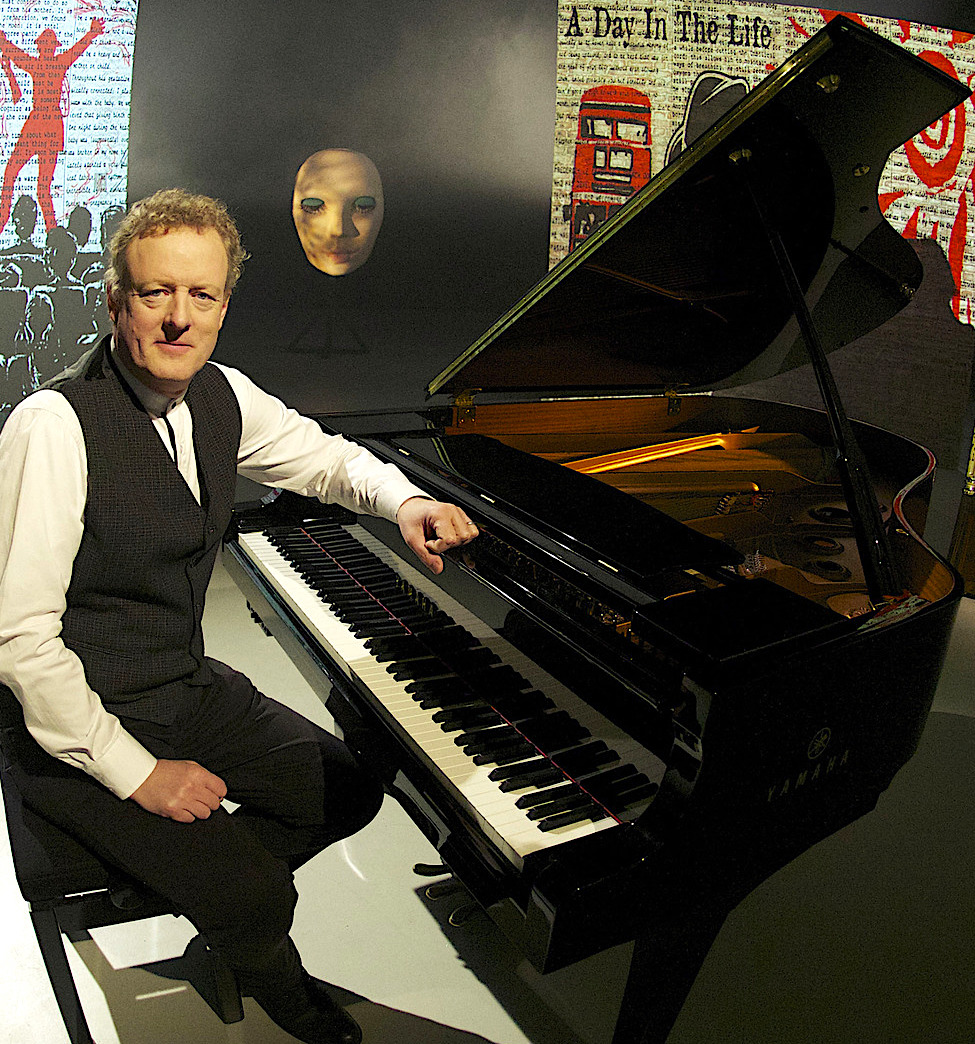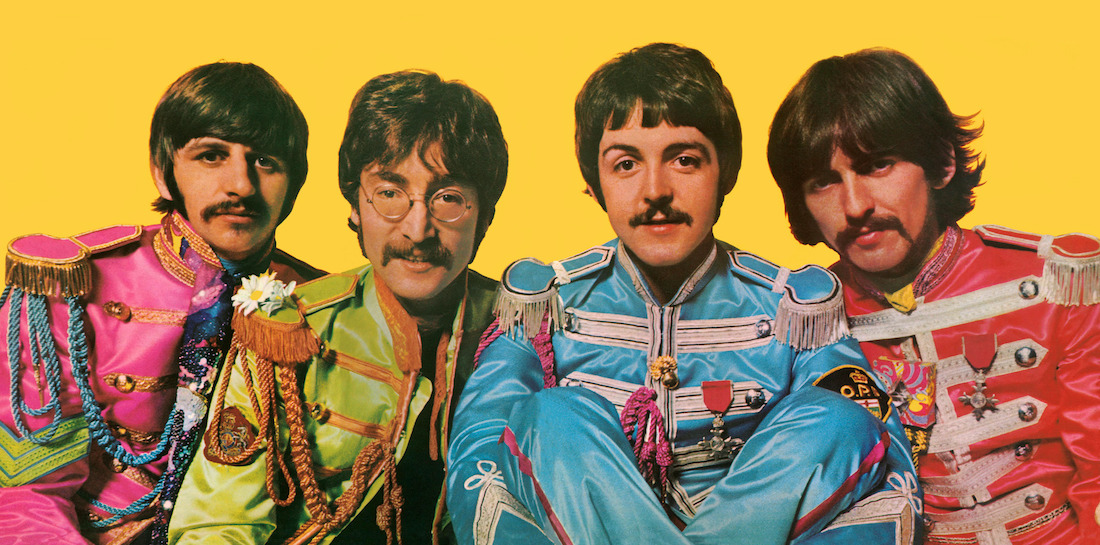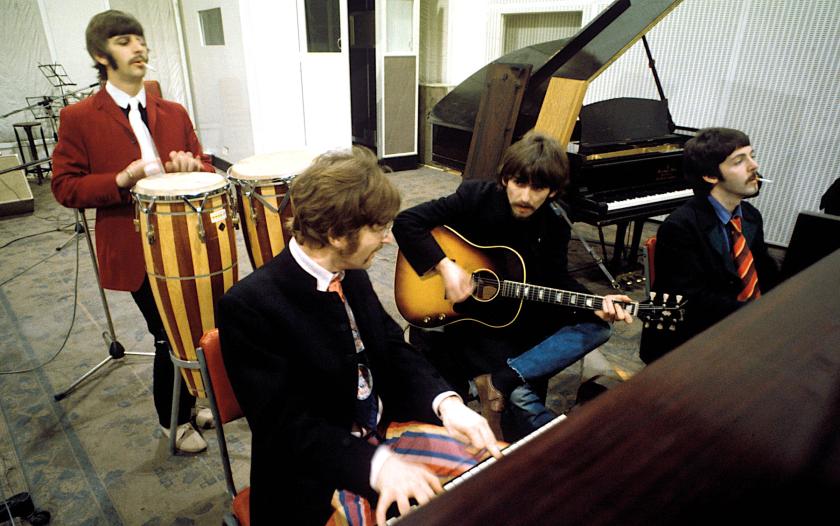It probably hasn’t escaped your notice that we are celebrating the 50th anniversary of Sgt Pepper’s Lonely Hearts Club Band, the triumphant vindication of the Beatles' decision to quit touring and instead exploit the possibilities of the recording studio. Could there be anything new to say about an album so thoroughly analysed, anatomised, eulogised and mythologised?
Eager to answer that question with a resounding “yes” came Howard Goodall, bounding eagerly into the studio to tell us why, exactly, Sgt Pepper is so blinking marvellous and how it blew open the doors to a limitless new musical universe. Goodall (below) resembles an enthusiastic choir master or perhaps a crusading cleric brandishing raffle tickets, but his great gift (apart from the way he seems able to find almost all music absolutely brilliant) is his knack for unpicking quite complicated bits of musical theory and making them not only comprehensible, but fascinating.
 He shaped his Pepper-thon by focusing on selected highlights from the disc to throw revealing light on the whole. In fact he started with a couple of tracks – “Strawberry Fields Forever” and “Penny Lane” – which weren’t actually on the album, but were recorded in the same bout of recording sessions and were hastily released as a double-A sided single to stem a seven-month drought of Beatle product (an eternity in pop’s mid-Sixties frenzy). Not only did the two songs’ theme of childhood nostalgically reinvented prefigure Pepper, but so did the novelty and ingenuity of their construction.
He shaped his Pepper-thon by focusing on selected highlights from the disc to throw revealing light on the whole. In fact he started with a couple of tracks – “Strawberry Fields Forever” and “Penny Lane” – which weren’t actually on the album, but were recorded in the same bout of recording sessions and were hastily released as a double-A sided single to stem a seven-month drought of Beatle product (an eternity in pop’s mid-Sixties frenzy). Not only did the two songs’ theme of childhood nostalgically reinvented prefigure Pepper, but so did the novelty and ingenuity of their construction.
Take, for example, the way “Penny Lane” was built on four completely different-sounding piano tracks, while also finding room for a harmonium and a piccolo trumpet inspired by Bach’s second Brandenburg Concerto. Not to mention its use of Paul McCartney’s version of Little Richard’s eight-to-the-bar beat modified to an insistent flat-four stomp. Goodall’s account of how two separate takes of “Strawberry Fields”, in different keys and tempi, were ingeniously blended together by engineer Ken Townsend varying the power supply to the tape machines was remarkable (and different to other published accounts).
Goodall’s talent for turning musicology into entertainment came to the fore in his dissection of “Lucy in the Sky with Diamonds” (a song inspired more by Alice in Wonderland than by LSD, he posited). His peroration on the way McCartney’s bassline lent character to the song by wandering away from its increasingly “flaky” home key of A major to amble through F sharp minor, D minor and B flat felt wholly persuasive, especially when he sat at the piano to demonstrate how the song would have sounded if performed more conventionally. His capsule analysis of traditional modal scales, particularly the Aeolian mode used in “She’s Leaving Home”, helped to explain the song’s pervasive sense of melancholy.
 Goodall’s concluding section on the creation of “A Day in the Life”, especially the frenetic orchestral crescendo (a specimen of “aleatoric” composition, it seems) and the legendary Final Chord, was edge-of-the-seat stuff, but perhaps the most educative passage was his exploration of how George Harrison devised “Within You Without You”. This was the first time I can remember anybody explaining patiently for the layman how Indian music is constructed, with its use of “taal” rhythmic patterns which evolve and proliferate. He demonstrated how Harrison had adapted Indian forms to appeal to the Western pop ear by getting Shahid Khan to sing “Within You Without You” in authentic Indian classical style, embellishing Harrison’s basic tune with melismas and microtones.
Goodall’s concluding section on the creation of “A Day in the Life”, especially the frenetic orchestral crescendo (a specimen of “aleatoric” composition, it seems) and the legendary Final Chord, was edge-of-the-seat stuff, but perhaps the most educative passage was his exploration of how George Harrison devised “Within You Without You”. This was the first time I can remember anybody explaining patiently for the layman how Indian music is constructed, with its use of “taal” rhythmic patterns which evolve and proliferate. He demonstrated how Harrison had adapted Indian forms to appeal to the Western pop ear by getting Shahid Khan to sing “Within You Without You” in authentic Indian classical style, embellishing Harrison’s basic tune with melismas and microtones.
Throughout, Goodall’s swirling trip was smoothly enhanced by snippets of studio chat between the Beatles and producer George Martin, clips from the Beatles’ own films and moody archive footage of mid-Sixties Britain, and studio décor which dissolved between various design themes to reflect the content of particular songs (a platinum disc to director Francis Hanly). They really should get Goodall to do this more often.















Add comment